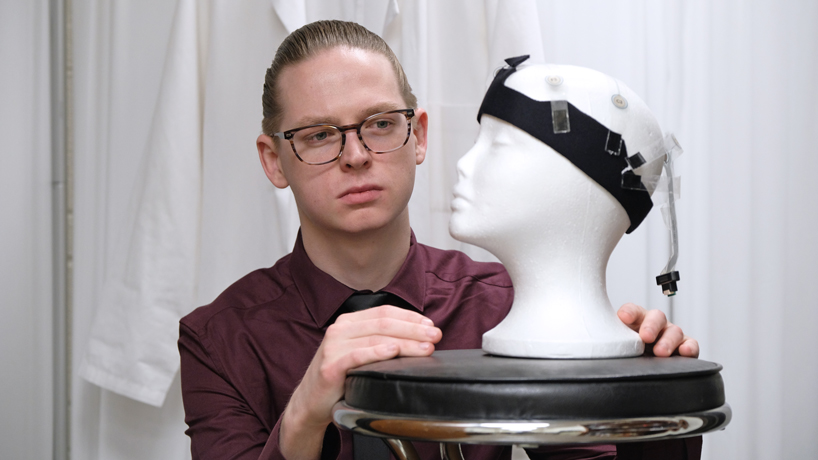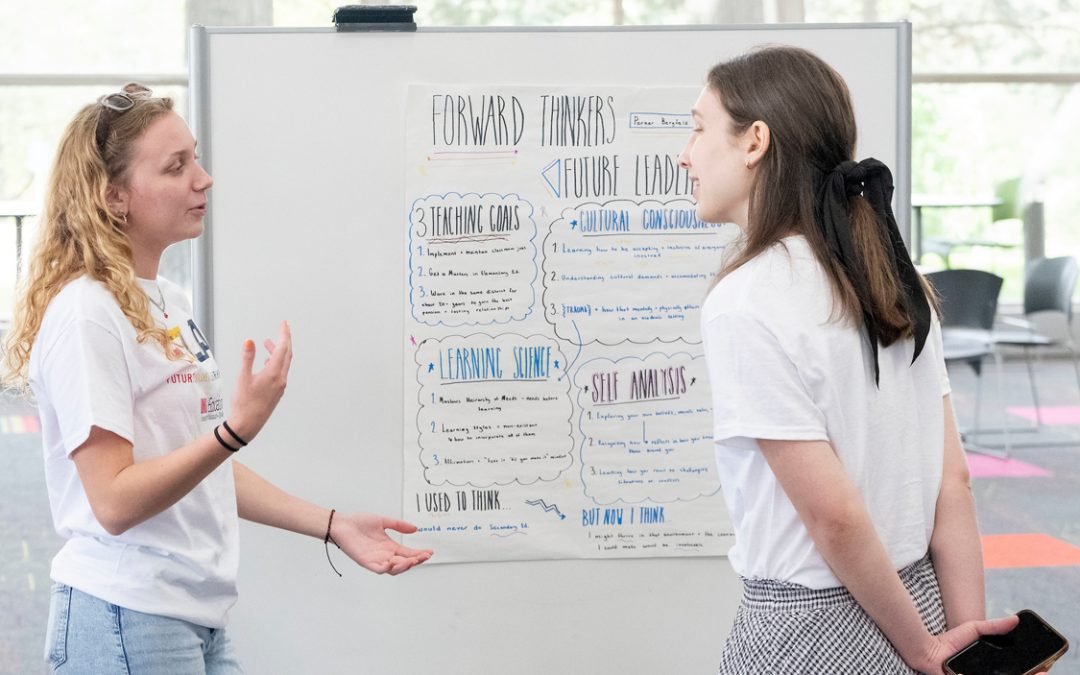
A look into the physiological effects of sexism uncovered both scientific and personal discoveries for undergraduate researcher Drake Anderson. While at UMSL, the psychology major has worked in the neuroscience labs of assistant professors Bettina Casad and Suzanne Welcome. (Photo by August Jennewein)
Three years ago, Drake Anderson was a suburban-raised teen with little to be angry about.
He had a clear path ahead through his top college choice – the University of Missouri–St. Louis – with a major he had been thinking about since elementary school – psychology.
Anderson was confident these decisions would take him somewhere. He just didn’t think it would be to the steps of the Missouri State Capitol, where he would speak with legislators about higher education and sexism.
But after taking a job in Assistant Professor Bettina Casad’s research lab his freshman year, Anderson’s outlook on life, research and the harsh realities of discrimination are much different.
During his tenure in Casad’s lab, Anderson has assisted with several studies focused on identifying how stigma and prejudicial environments influence physical health, brain functioning, and education and career performance.
What he has discovered is both enlightening and concerning.
In one particular study, Anderson and other members of Casad’s lab found that some women who stayed silent after experiencing a sexist comment showed signs of total peripheral resistance, a restriction of blood flow throughout the body. This resistance is associated with heart disease and hypertension, creating physiological concerns for victims of perpetual discriminatory behavior.
Through this research, Anderson, who is also involved in Assistant Professor Suzanne Welcome’s behavioral neuroscience lab, has come to realize that demeaning comments, even if made in jest, can be powerful, cutting and spark long-term health consequences.
“I think the biggest implication of this study is that it’s more than just being upset or uncomfortable,” the Pierre Laclede Honors College junior explains. “There are physical health issues that can arise from being in a sexist condition, specifically with being told to maintain group harmony.
“In the real world, it’s not always possible to stand up and be your own advocate. Sometimes, you have to suppress that and move on. This study shows that you can have significant health problems from suppressing those responses.”
The implications of the study also apply to other forms of prejudice, prompting Anderson to speak out about the research.
Since his first year at UMSL, he’s presented study findings at undergraduate research symposiums in the St. Louis region, including UMSL’s URS. In April, he took his research on the road to Jefferson City, Missouri, where he presented alongside other UMSL and University of Missouri System students for Undergraduate Research Day at the Capitol.
The presentation allowed him to speak with state lawmakers about the significance of the lab findings and demonstrate the value of undergraduate research in higher education.
“My experience at UMSL has been very helpful,” says Anderson, who is just one of the many students taking advantage of undergraduate research opportunities across campus. “It feels like a smaller place where I can really be engaged and have opportunities for research. I’ve enjoyed my experience here a lot, and I don’t know that I would have had the same experiences at a different university.”
Thanks to his presentation skills, years of hands-on lab experience and portfolio of published work, Anderson has established a strong research identity – one Casad presumes will serve him well in an increasingly competitive graduate school application process.
Anderson also believes the revolving opportunities he’s acquired at UMSL will help as he pursues a career in researching subconscious influences of decision-making and behavior.
“Research is not something that I’ve always wanted to do, but once I saw it, it opened my eyes,” he says. “I think the biggest thing is that the more research you do and the more experience you get, the better off you are.”
This story was originally published in the spring 2018 issue of UMSL Magazine. Have a story idea for UMSL Magazine? Email magazine@umsl.edu.














